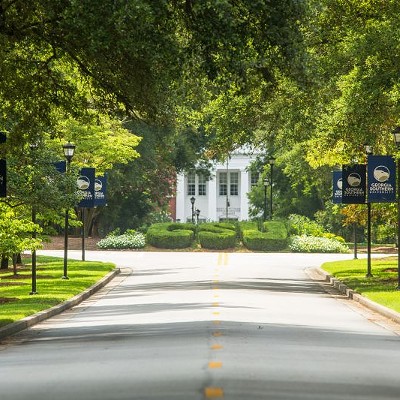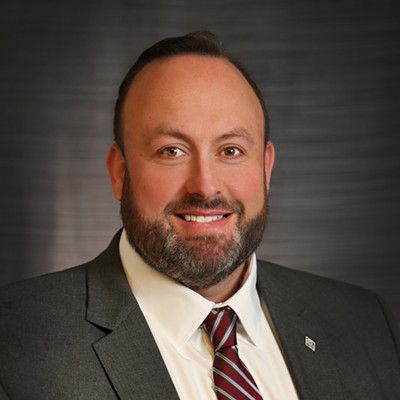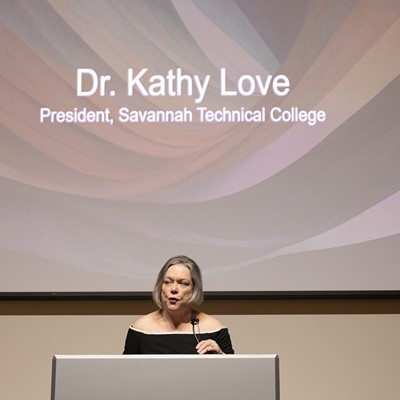The line between social media and reality has become all too evident in recent demonstrations against proposed budget cuts to the University System of Georgia.
Judging by Facebook activity, the fight against the potential budget cuts to the University System is being fought by thousands of students from around the state.
However, actually mobilizing the mouse pad activists has proved more difficult.
A planned rally during the second week of March had over 500 confirmed attendees according to a Facebook event page created for the demonstration. Rain that afternoon thinned the crowd to about 50.
Meteorological conditions wouldn’t be to blame for an event held in Forsyth Park last Thursday though. The sun was shining and the mercury topped 80 degrees. The potential protesters were surrounded by sunbathers and frolicking children.
“Maybe we’ll get 100,” says Kelly Kessinger–Griffin, an AASU student and mother of three who was the first person to arrive, with placards and children in tow.
Although Kessinger–Griffin isn’t part of a department that is currently speculated to be on the chopping block, she sees this is an issue that extends to all students.
“It’s a common misconception that they are the only ones being hurt by this,” she explains, listing a potential 30 percent tuition hike, increasing class sizes and more part time faculty among problems that will effect all students, if these budget cuts are finalized.
“The level of education is going to go down. That’s not just Armstrong — that’s statewide.”
Thursday’s event, which was touted as the last chance to take action — despite another planned demonstration next week — had several hundred confirmed attendees.
About two hours into the event there were maybe 25 students assembled, and after some discussion over where they should actually stand, several members, including two Georgia State students who had driven all the way from Atlanta for the rally, began handing out some fliers and asking for signatures to a petition.
“I’ve been surprised all around at the level of apathy in the school and in the community,” says Kessinger–Griffin.
There had been fliers hanging around the city advertising the rally, but the location was listed only as “Forsyth Park,” and several late arrivals said they had problems finding the others.
“We went to the wrong fountain,” says one student as she and several friends approach the benches where a few students are waiting.
The lack of response stands in direct contrast to the significance of the issue at hand, and the future of education in the state.
“Education could be the best hope for recovering the economy,” says Al Levine, a former professor who came out to support the students’ efforts.
If the projected budget cuts are finalized and whole departments are unraveled, “They’re not coming back,” says Levine, explaining that it would take several years and tens of millions of dollars to reconstruct the cancelled programs.
Of the proposed $300 million in cuts to the University System of Georgia, which includes AASU, SSU, GSU and UGA among others, Armstrong would be forced to shoulder about $5.2 million in cuts — that would be in addition to the cuts they were forced to make last year because of declining state revenue.
When the cuts are finalized, the effects will be felt quickly, and according to an address given by AASU President Dr. Linda Bleicken to the Student Government Association two weeks ago, the University could let go as many as 73 part time faculty and more 1,000 students could be forced to either relocate or change their majors.
Relatively few of those students were in attendance last Thursday. Among those that were, many were helping distribute fliers with the headline “Just Say No to USG Budget Cuts,” which outlined the issue, and also offered a potential solution to save the university system from any further reductions — an increase of the excise tax on tobacco.
State Representative Ron Stephens from the 164th District is the lead sponsor on just such a bill, House Bill 39, which would increase the price of a pack of cigarettes by a dollar in the state.
According to an op–ed written by Stephens, the tax “would raise an estimated $350 million in new state taxes and attract another billion dollars in federal health care funds to Georgia.”
Currently, Georgia’s tobacco tax is fifth lowest in the country, and the proposed increase would actually bring the state tax closer to the national average. The surcharge would also help erase of some of the red ink in the state’s Medicaid budget.
“Georgia’s 37 cents a pack cigarette tax generates about $237 million a year, but we spend $537 million a year treating smoking–related illnesses in Medicaid patients alone,” writes Stephens.
“That means Georgia’s taxpayers are subsidizing the medical costs for the smokers among us to the tune of $300 million a year.”
When Stephens penned the op–ed during the last week of February, he claimed to already have two–thirds of the support necessary in the House to move the bill forward.
According to the Georgia General Assembly website, the bill never made it past a second reading, and “Crossover Day,” the last day for legislation to move from the House to the Senate to make it for a vote before the close of the next session has passed.
Rep. Stephens remains confident though that the bill is still very much alive, and that he and some of his co–sponsors are “looking for other vehicles to attach it to,” meaning that it could become part of another piece of legislation that is set to be vote upon in the next few months.
Whether the tobacco revenue will solve the University System budget issues remains to be seen though.
For Kessinger–Griffin, if it doesn’t, the hike in tuition might shut the door on her hopes for higher education.
“I pay for my school,” she says. “A tuition hike is detrimental because with three kids, I’m barely getting by as it is.”
The time frame for answers to some of the questions hanging over the heads of students, faculty and administrators alike is vague at best.
“Things are changing on a daily basis,” says AASU spokesperson Francisco Duque.
Currently, the Board of Regents is negotiating with legislators and everyone is hoping for an answer by the end of the month or early next month.































